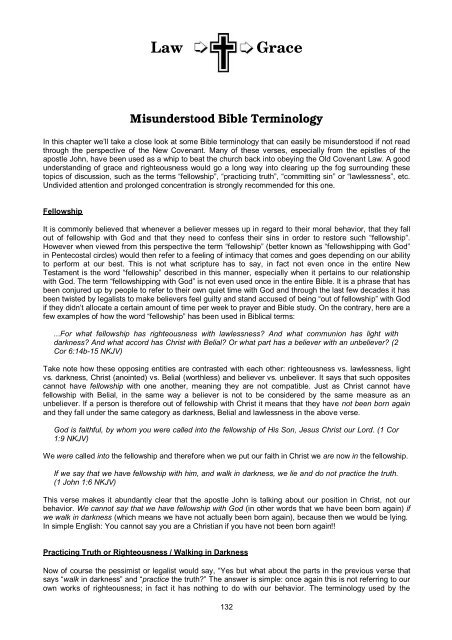Grace, the Forbidden Gospel - Online Christian Library
Grace, the Forbidden Gospel - Online Christian Library
Grace, the Forbidden Gospel - Online Christian Library
You also want an ePaper? Increase the reach of your titles
YUMPU automatically turns print PDFs into web optimized ePapers that Google loves.
Law <strong>Grace</strong><br />
Misunderstood Bible Terminology<br />
In this chapter we’ll take a close look at some Bible terminology that can easily be misunderstood if not read<br />
through <strong>the</strong> perspective of <strong>the</strong> New Covenant. Many of <strong>the</strong>se verses, especially from <strong>the</strong> epistles of <strong>the</strong><br />
apostle John, have been used as a whip to beat <strong>the</strong> church back into obeying <strong>the</strong> Old Covenant Law. A good<br />
understanding of grace and righteousness would go a long way into clearing up <strong>the</strong> fog surrounding <strong>the</strong>se<br />
topics of discussion, such as <strong>the</strong> terms “fellowship”, “practicing truth”, “committing sin” or “lawlessness”, etc.<br />
Undivided attention and prolonged concentration is strongly recommended for this one.<br />
Fellowship<br />
It is commonly believed that whenever a believer messes up in regard to <strong>the</strong>ir moral behavior, that <strong>the</strong>y fall<br />
out of fellowship with God and that <strong>the</strong>y need to confess <strong>the</strong>ir sins in order to restore such “fellowship”.<br />
However when viewed from this perspective <strong>the</strong> term “fellowship” (better known as “fellowshipping with God”<br />
in Pentecostal circles) would <strong>the</strong>n refer to a feeling of intimacy that comes and goes depending on our ability<br />
to perform at our best. This is not what scripture has to say, in fact not even once in <strong>the</strong> entire New<br />
Testament is <strong>the</strong> word “fellowship” described in this manner, especially when it pertains to our relationship<br />
with God. The term “fellowshipping with God” is not even used once in <strong>the</strong> entire Bible. It is a phrase that has<br />
been conjured up by people to refer to <strong>the</strong>ir own quiet time with God and through <strong>the</strong> last few decades it has<br />
been twisted by legalists to make believers feel guilty and stand accused of being “out of fellowship” with God<br />
if <strong>the</strong>y didn’t allocate a certain amount of time per week to prayer and Bible study. On <strong>the</strong> contrary, here are a<br />
few examples of how <strong>the</strong> word “fellowship” has been used in Biblical terms:<br />
...For what fellowship has righteousness with lawlessness? And what communion has light with<br />
darkness? And what accord has Christ with Belial? Or what part has a believer with an unbeliever? (2<br />
Cor 6:14b-15 NKJV)<br />
Take note how <strong>the</strong>se opposing entities are contrasted with each o<strong>the</strong>r: righteousness vs. lawlessness, light<br />
vs. darkness, Christ (anointed) vs. Belial (worthless) and believer vs. unbeliever. It says that such opposites<br />
cannot have fellowship with one ano<strong>the</strong>r, meaning <strong>the</strong>y are not compatible. Just as Christ cannot have<br />
fellowship with Belial, in <strong>the</strong> same way a believer is not to be considered by <strong>the</strong> same measure as an<br />
unbeliever. If a person is <strong>the</strong>refore out of fellowship with Christ it means that <strong>the</strong>y have not been born again<br />
and <strong>the</strong>y fall under <strong>the</strong> same category as darkness, Belial and lawlessness in <strong>the</strong> above verse.<br />
God is faithful, by whom you were called into <strong>the</strong> fellowship of His Son, Jesus Christ our Lord. (1 Cor<br />
1:9 NKJV)<br />
We were called into <strong>the</strong> fellowship and <strong>the</strong>refore when we put our faith in Christ we are now in <strong>the</strong> fellowship.<br />
If we say that we have fellowship with him, and walk in darkness, we lie and do not practice <strong>the</strong> truth.<br />
(1 John 1:6 NKJV)<br />
This verse makes it abundantly clear that <strong>the</strong> apostle John is talking about our position in Christ, not our<br />
behavior. We cannot say that we have fellowship with God (in o<strong>the</strong>r words that we have been born again) if<br />
we walk in darkness (which means we have not actually been born again), because <strong>the</strong>n we would be lying.<br />
In simple English: You cannot say you are a <strong>Christian</strong> if you have not been born again!!<br />
Practicing Truth or Righteousness / Walking in Darkness<br />
Now of course <strong>the</strong> pessimist or legalist would say, “Yes but what about <strong>the</strong> parts in <strong>the</strong> previous verse that<br />
says “walk in darkness” and “practice <strong>the</strong> truth?” The answer is simple: once again this is not referring to our<br />
own works of righteousness; in fact it has nothing to do with our behavior. The terminology used by <strong>the</strong><br />
132

















